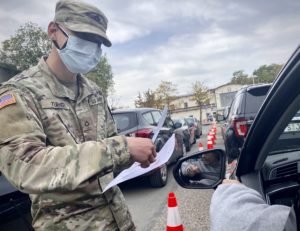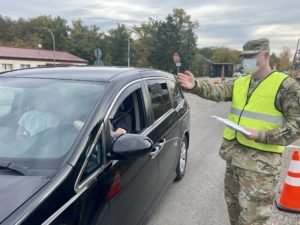By Becca Castellano
U.S. Army Garrison Stuttgart

When COVID-19 struck Stuttgart High School this fall, long lines of cars formed on Patch Barracks as community members sought testing.
They’d roll down their windows to meet Soldiers like Pfc. Donavon Turner, of the 52nd Signal Battalion, who would explain the testing procedure, hand out intake sheets and run back and forth to Stuttgart Army Health Clinic – sometimes several blocks away, to inform people. Turner, an information technology specialist, is normally working on computers.
Like many units in U.S. Army Garrison Stuttgart, his battalion has offered what’s known as “borrowed military manpower” or BMM to assist during high volumes of coronavirus testing.
“We’re here to help (the clinic) control the mass amount of people that need to be tested on a daily basis and provide the patients that need it, the best care that they can,” said Turner. “I just enjoy being able to assist in any way I can.”
Recently, the clinic, working with garrison staff have created a streamlined testing area adjacent to the Patch commissary.
Since the first positive COVID-19 case, the clinic tested more than 15,000 patients and traced more than 18,000 encounters, all while continuing to provide health care for the community. Maj. Riliwan Ottun, the clinic’s executive officer, said it would not have been possible without the support of everyone who stepped outside of their day jobs to help.
“Force health protection in a global pandemic is a garrison mission and we are only a piece of that protection, it’s much larger than our 145-person team can handle alone.” he explained. “The BMM are a critical part of our success. We could not do it all without their support.”
The garrison’s first positive COVID-19 case was March 13. Overnight, clinic staff initiated a pandemic plan – something that never affected the community before. No garrison-level plans fit the situation, said Ottun.
“In the beginning the positives were coming rapidly,” Ottun said. “Those first three or four weeks were rough.”
Clinic personnel set up a screening site outside the clinic. They had to keep potentially infected people away from others, like a community member refilling a prescription or arriving for a checkup. They also developed a process for tracing positive cases and contacts, as well as guidelines for quarantining and isolation, Ottun said.
All along, the clinic faced its own manning shortages. Some staff were isolated and quarantined.

“It was long days and long hours,” Ottun said. “We never operated in a quarantine model before.”
The clinic sent out a request to local units for help. Several answered the call.
While medically trained personnel fill roles both inside the clinic and at the outside drive-through testing, non-medical personnel help maintain supply lines, screen patients and run paperwork. Soldiers supporting the effort are assigned roles based on how long they can work, Ottun said.
“If someone is coming for a few days or even hours we have plenty of ways they can help that won’t require as much training, they can run paperwork or direct cars” Ottun said. “If someone is coming for a month, we know we can use them in bigger roles because they will be with us a while.”
Staff Sgt. D’Hrett Massey, who works at a local unit, spent 30 days as the NCO in charge of the COVID-19 drive-through testing center. During his tenure, many improvements were made.
“A month gave me the continuity to learn every step, so I can understand why things are the way they are and answer questions that people in line have,” Massey said. “It also helped me prepare a pass down for my relief.”
